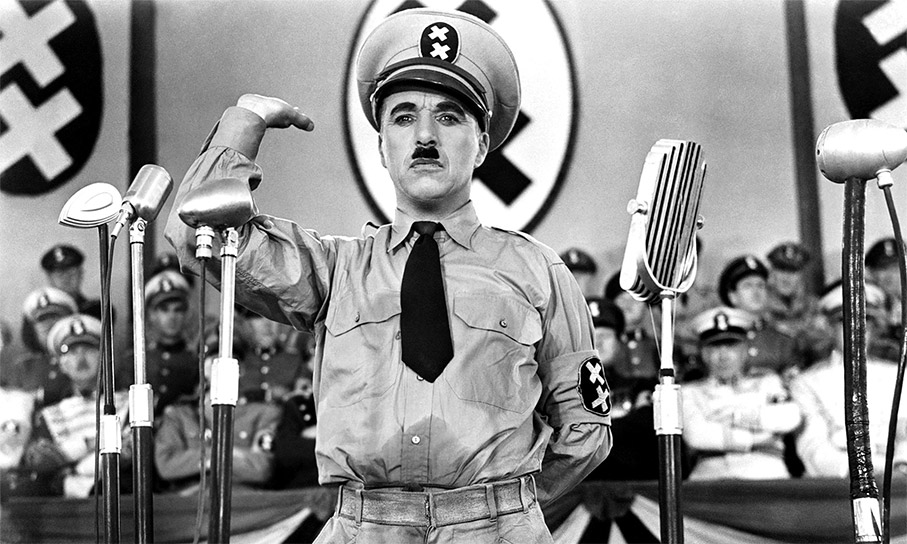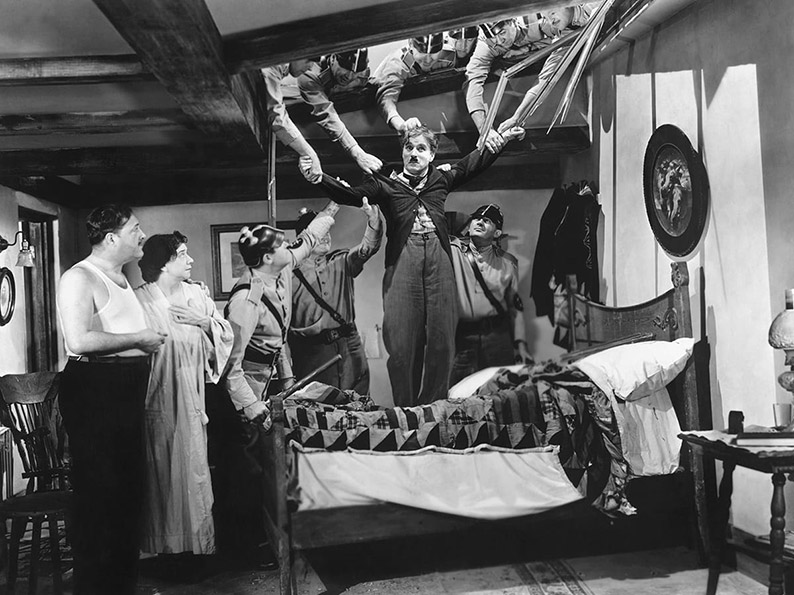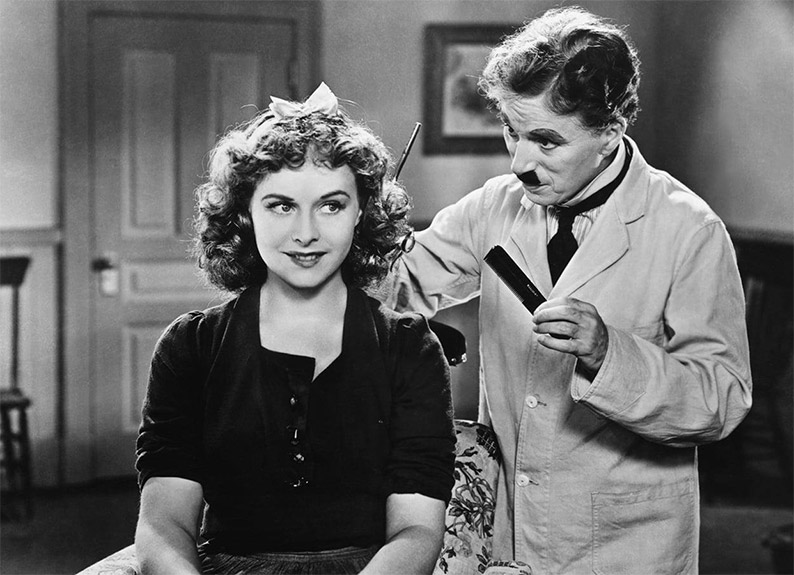|
The Great Dictator is an important Charlie Chaplin film for reasons that I will discuss in this review. Criterion has put together an excellent Blu-ray package.
I have recently been watching a series of Chaplin films (The Kid, The Gold Rush, The Circus, City Lights, Modern Times) in chronological order and it has been a richly rewarding experience. I had never seen a Chaplin short or feature before this and I have discovered one of the great artists of cinema. He is a true auteur, and the term Chaplinesque has become part of the language of film.
During the 1910s and 1920s, Chaplin was, for most of this time, the highest paid salaried individual in the world. He had the resources to transition into the sound era, but what would happen to the Little Tramp? City Lights (1931) remained a silent film apart from a few comic sound effects. Modern Times (1936) contains some spoken dialogue, but when it comes to the Little Tramp he ingeniously maintains the integrity of the character while he reveals his speaking (more precisely his singing) voice. The Great Dictator (1940) is the turning point in Chaplin's career – it is his first sound film, despite the technology having been established for about 10 years already!

The similarities between Chaplin and Hitler are fascinating. They were born within 4 days of each other, brought up in poverty, and both were destined to wield great power (albeit of a different kind) – and let's not forget the moustache connection. Chaplin studied Hitler's speeches and called him the greatest living actor – Hitler watched Chaplin's films and even accused him of being a Jew!
I had mixed feelings watching this film – satire remains one of the artistic methods of criticising oppressive regimes who do not allow freedom of speech. However Chaplin uses this ancient form from a position of freedom. He made this film in a Western democracy (encouraged by President Roosevelt) and without any censoring – he financed the film himself and so had no constraints.
Filming began in September 1939 just a few days after Hitler invaded Poland. The threat that Hitler posed to humanity and freedom was now apparent and became clearer as the war escalated. Chaplin wrote in his 1964 autobiography that had he been aware of the extent of Hitler's atrocities that he would not have made The Great Dictator. When the film was finally released in October 1940, we were still over one year from the enactment of The Final Solution and several years from the discovery of the extent of the tragedy.
The film was informed by the partial truth concerning Hitler and the Nazis that was known up to 1940. I try to keep this in mind when I watch the film to temper my criticism. In the film, Hitler is portrayed as maniacal, insecure and self-absorbed – the truth that manifested over time was more disturbing and evil. The persecution of the Jews is shown as oppressive and occasionally deadly (Jews are killed by Nazi soldiers in the film), but it pales into comparison with the evil atrocities that were inflicted on this group of people. So when I watch this film I try to take all this into account – by the time that Chaplin filmed the final speech, he was more aware of the danger that Hitler posed to the Free World (France and Denmark were then under Nazi occupancy) and so the speech becomes, I believe, a sincere call for peace that comes straight from Chaplin's own heart (he recites it in his own speaking voice!).

Up to this point, Chaplin was still The Little Tramp, and in this film he developed the Jewish barber who is a variation of that character. He also developed the character of Hynkel (Hitler!). Chaplin brilliantly ridicules the acting out that Hitler did during his speeches, demonstrating his vocal virtuosity in a way that is highly amusing. Chaplinesque slapstick moments abound between Hynkel and his minions with particularly funny moments with Napaloni (brilliantly played by Jack Oakie).
There are great moments set against tremendous production design, but there is also a tediousness to much of the dialogue (particularly the weak expository script given to the Jewish characters, in particular to Paulette Goddard) and the middle section does lose momentum. There are great laughs, great set pieces, lots of physical comedy aided by undercranking (silent era technique of speeding up the footage), pathos, and at the end we get a stirring speech that is timeless in its call for us to live the values of freedom, tolerance and compassion.
I will be very interested in how this film stands up for me on repeat viewings.
This is a pre-2010 (date of the U.S Criterion Blu-ray release) 2k scan. I understand that it is the same source as the previous Artificial Eye release. The print is in very fine condition almost free from any scratches or blemishes – the detail and the contrast is excellent. The film has been transferred in its original aspect ratio of 1.33:1.
The sound is Mono LPCM 1.0 and the music and dialogue is clear and well balanced.
Optional English subtitles for the deaf and hearing impaired are included.
Commentary from Kamin and Mehran
I really enjoyed this commentary – both speakers were well rehearsed and seamlessly took turns in commenting on various aspects of the film. There is a very good balance between background facts and appreciation for the artistic merits of the film.
The Tramp and The Dictator (2001) (55mins)
This is a remarkable documentary by the great Kevin Brownlow and Michael Kloft. There is a slew of interviews with other film-makers and writers and excellent background on Hitler and Chaplin.

The Clown Turns Prophet (21mins)
A terrific visual essay using still pictures to discuss Chaplin's interest in Hitler and the production of the film.
Chaplin's Napoleon (20mins)
This second visual essay looks at Chaplin's lifelong fascination with Napoleon and how this may have merged with his desire to make this film.
Sydney Chaplin footage (27mins)
Extensive colour footage of the behind the scenes (silent) making of the film – we see camera cranes, set ups, rehearsals, etc. It is a great archive of Chaplin's film-making.
Barbershop footage from 1919 Sunnyside and 1921 King, Queen, Joker
These early shorts show Chaplin's creativity and comedy around scenes in a barbershop and they connect well with the barbershop scenes in The Great Dictator.
Booklet
In 2010 Criterion were still producing impressive booklets and this one is particularly effective. The essay by Michael Wood looks at the controversial question of the satirising of a man like Hitler and the Nazis. There is a very interesting response from Chaplin which appeared in the New York Times on 27th October 1940 (less than 2 weeks after the film's premiere) addressing criticism of the film's final speech. Jean Narboni examined the film's final act and the fact that Chaplin would "For the first time in the history of film really speak."
The Great Dictator is fascinating and flawed. Chaplin is one of cinema's greats but the character with which he became so popular could not transfer into the age of sound films. In 1940, driven by his fascination/fear of Hitler, his first sound film proved to be a work that is remembered for its comic moments, its exquisite satire, its flawed representation of Hitler and the Jews, the birth of Chaplin the speaking actor and its great call for humanity. The film contains so much – it is very dense. For me Chaplin's genius and magic is embedded in films like The Kid, The Gold Rush, City Lights and Modern Times – but Chaplin evolved and the result is an important film, despite any reservations I might have. Criterion have given us an excellent package – a great transfer and a wealth of supplements to contextualise the film. Recommended.
Due to technical limitations (our reviewer does not have a Blu-drive connected to his PC) the above images are not screen grabs and have been included for illustrative purposes only.
|